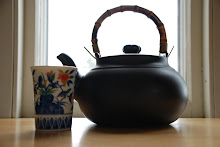
Another rainy morning. But I got on my bike nevertheless and pedaled to the farmers' market. There were only a handful of weeks left before the outdoors market would close for the season -a few more bike rides on paths cushioned with tawny leaves until it would be too cold to do so in my thin Polartec jacket. So I soldiered on in the drizzle and arrived at the market as the rain petered out. A band was playing as I pulled up - a scratchy rendition of a well-known reggae tune played to a sparse audience.
I got off my bike, locked it, and with my empty knapsack tossed over my shoulders, proceeded to make the rounds. My first stop was my favorite: a produce stand presided over by two elderly Hmong women. Faces wizened and weatherbeaten, they smiled as I approached. With a flourish of her hands, the younger of the two - more adept in English than her companion- showed me her harvest of the week. It included a very green bouquet of spinach which I snapped up without hesitation. The bok choy, a staple from her farm and a staple of my stir-fries, was sadly pock-marked and wilted. She saw my disappointment and motioned me to a wooden crate in which a few Roma tomatoes languished. She pointed to their bruised and blighted skins. Everything froze, she said (her farm was at least 50 miles north of the city, in Sheboygan, and I was not surprised that the first frost had set in already there) and pointed to the mustard greens in the corner, except these. The hardy leaves of the mustard greens were indeed startlingly vibrant, piled high in a profusion. They seemed forgotten in their nook, unglamorous cousins to the red-stemmed chard nearby. Here, take one, she said, and she gave me a tied bundle of the greens. I took it and thanked her.
She told me that she may not be coming back next week to the market because of the gas prices and the low yield from her harvest. Her van, rusty white and huge, stood behind the vegetable stand where boxes of unsold produce remained stacked on one another. On the table in front of me, though, lay hardy-looking green beans and ripe oblong plums. She placed a plum in my hand and gestured for me to taste it. As I bit into it, I was half-expecting an unwelcomed tartness; instead, I was greeted by a lush sweetness. Soon, my knapsack bulged to its limit and I bade my farmers goodbye: Yes, we will meet again next season.
Later on, as I sat down to my tea, a new one called Steamed Green Needles (also picked up at the farmers' market earlier that day), I thought of a Hmong patient of mine. She first saw me for chest pain and difficulty in breathing which appeared out of the blue. She initially went to the local emergency room, thinking that she was having a heart attack. However, extensive testing there did not show anything dire, and she was told to go home and make an appointment to see me.
I walked into my examining room as she sat waiting for me, straight-backed in her chair. Her brows furrowed as she told me of her recent ordeals: she had no appetite and was rapidly losing weight; she had only snatches of sleep at night. Mostly, she lay awake listening to her heart thump away and constrict. At work, she would feel the chest pain come on while sitting at her desk. We talked for awhile and I learned about her past. She had lived in the jungles of Laos, on the run with her family. During the daytime, they hid. At night, under the cover of darkness, they fled to safety. She became separated from her family (eventually, she did reunite with them) and later on had nightmares about it. That part of her life was behind her, but now she became panicky whenever the sounds of fireworks reached her from the lakefront on the Fourth of July.
Presently, she receives treatment for her condition and is doing better. Her symptoms may never completely go away but they recur less as time goes by.
As I sipped the Green Needles, I remembered the last time I saw her in my office. She wore a bright scarf and allowed her shoulders to relax as she sat in the same chair in which she held herself so rigidly the first time we met. As she talked, I no longer detected that note of fear in her voice. I felt hopeful then as we sat together, and now, as I finished my second infusion of this quintessentially Chinese green tea - sweet, with a note of brine, astringent- I imagined wounds that can heal.





3 comments:
What a terrific post. You certainly earned that soothing cup of tea.
Thanks,A. I'll miss going to the farmers' market in the upcoming months. We'll have to make up for it with more tea soon!
I can just taste that plum with its sweetness instead of the unripe greenness too hard for the palate. I've had my physical for the year and now have to do another test. I've beaten high cholesterol by changing my diet in the past few years. It feels good to solve these problems.
Post a Comment